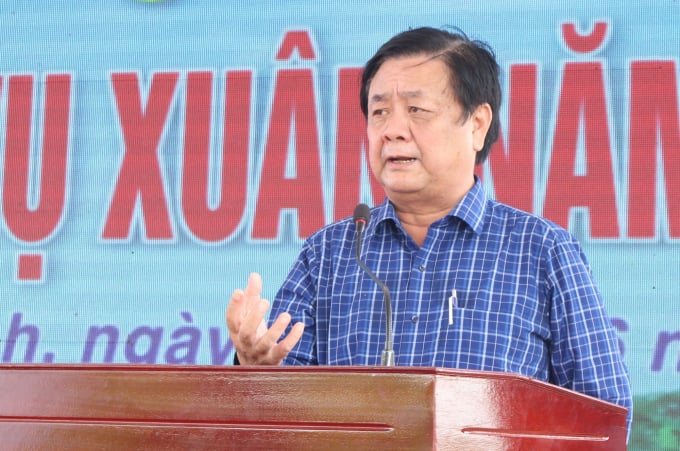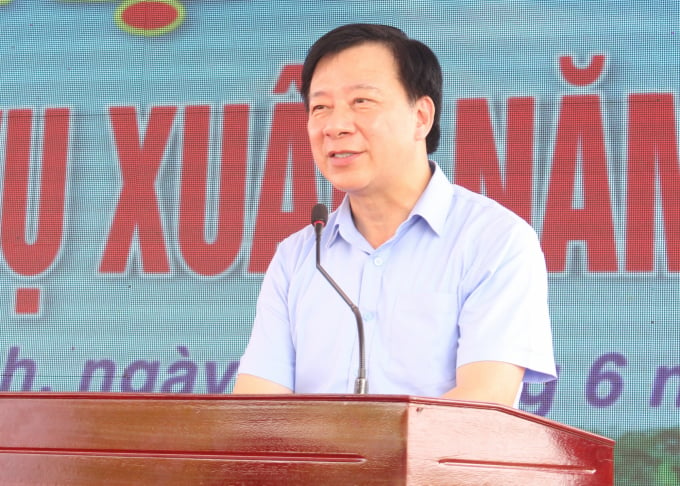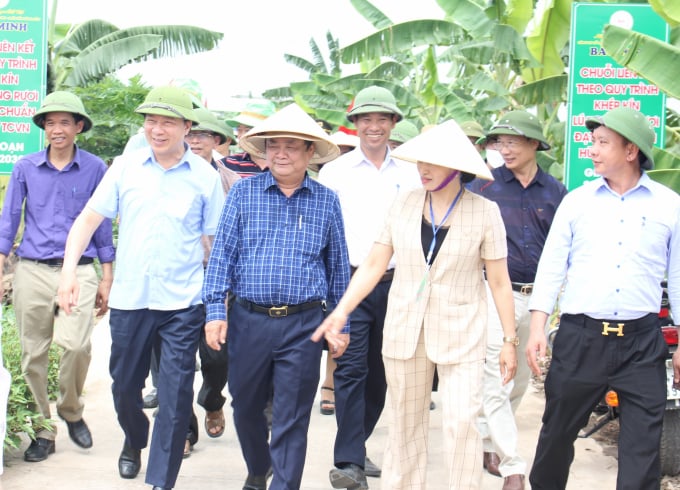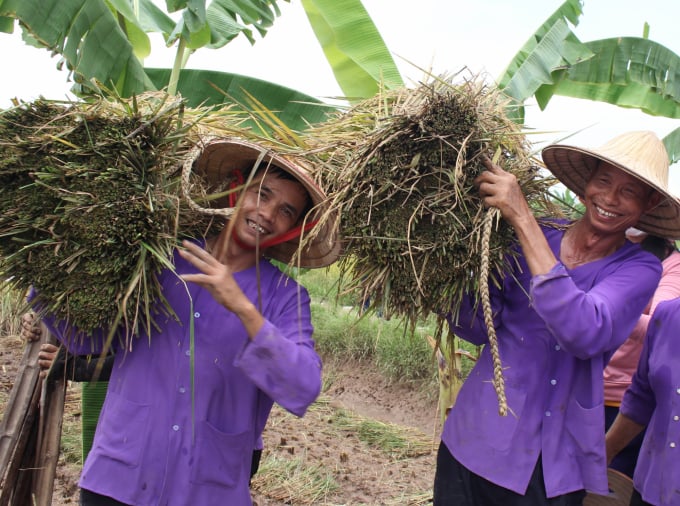May 21, 2025 | 04:19 GMT +7
May 21, 2025 | 04:19 GMT +7
Hotline: 0913.378.918
May 21, 2025 | 04:19 GMT +7
Hotline: 0913.378.918
Within the framework of Tu Ky Organic Rice Festival in spring season 2022, organised by Tu Ky District People's Committee, Hai Duong Province on June 13, Vu Thi Ha, Chairwoman of the district said that it now had 257 ha of organic agricultural production in combination with exploitation and conservation of natural specialties.
In organic production areas, an effective and sustainable crop rotation formula was established with five layers of exploitation (ragworms underground, uca vocans on field side, spring rice in the field, on the shore is leafy vegetables, spices vegetables and fruit trees on top), creating a healthy and sustainable ecosystem.

Minister of Agriculture and Rural Development Le Minh Hoan, shared his concerns about the story of developing "agriculture for the sake of humanity". Photo: Trung Quan.
The total annual production of organic agricultural products is about 2,300 tonnes with more than 1,200 tons of rice, 200 tons of rice, 90 tons of rice, 780 tons of bananas, giving an income of VND400-450 million per ha per year.
According to Ha, the exploitation and conservation of specialties in combination with organic agricultural production not only brought high economic efficiency, but also contributed to environmental protection, people's health, and maintenance of the field's ecosystem, aquatic and sustainable development for organisms.
On that basis, in May 2022, the 137-hectare agricultural production area combined with mollusc farming in An Thanh commune was certified to meet Vietnam's organic agricultural standards (TCVN 110441-2:2017).
This is the first recognised organic production area of the district and Hai Duong province.Certified products include rice (more than 104 ha), banana (25 ha), jackfruit (5 ha), leafy vegetables (1.5 ha) and spices (1 ha).
The average output is over 1,000 tonnes per year, the production value is estimated at VND500-700 million per ha.
Every year, the District People's Committee implemented a policy to support seeds, biological products, and provide technical training for households in the organic rice production area to improve the cultivation area and facilitate the combination of harvesting and harvesting ragworms and uca vocans.
The production association and branding for Tu Ky organic agricultural products are maintained and expanded together.
Currently, there are many units registered to participate in investment, production and consumption for the people such as Bao Minh Agricultural Products Processing and Trading Joint Stock Company, New Generation Agriculture Joint Stock Company and Babeeni Vietnam Co., Ltd.
Ha added that in the coming time, Tu Ky district aimed to certify organic for the remaining 120 hectares of the production and exploitation area of ragworms and uca vocans in the communes of Quang Trung, Binh Lang, Chi Minh, Cong Lac, Nguyen Giap, and Ha Thanh.

Secretary of Hai Duong Provincial Party Committee Pham Xuan Thang said the province was steadfastly developing agriculture in the direction of developing a multi-layered and multi-valued agricultural economy. Photo: Trung Quan.
The organic production area in combination with the exploitation of mollusks would be continued in the fields in An Thanh commune, Quang Trung.
By 2025, it is targeted to complete the renovation of 294 ha , increase the area of organic production in combination with the exploitation of ragworms and uca vocans to 700 ha and gradually implement the organic certification for this area.
The province will call for and attract large enterprises to invest in building infrastructure and services, and putting into operation the Soi River eco-tourism area and Vietnam's ancient village in An Thanh commune.
Travel businesses are called for opening tours to embroidery village, Lac Duc temple communal house high-tech agricultural production point, organic agriculture. of the district.
Pham Xuan Thang, Secretary of Hai Duong Provincial Party Committee waid that the province was persistently developing agriculture in the direction of developing a multi-layered, multi-valued, agricultural economy based on on the potential of its own advantages, differences in the agricultural sector.
Tu Ky district in particular and Hai Duong province in general focus on developing endemic agricultural products that not only help improve nutritional value for consumers, but above all, associate agricultural products with enhancing cultural values through the form of experiential tourism.
As a result, new values for agricultural production, for farmers, towards building a more sustainable agricultural production would be promoted.

Minister Le Minh Hoan (3rd from the right) and Pham Xuan Thang (second from left) and leaders of the province, Tu Ky district visited the organic rice production area in An Thanh commune. Photo: Trung Quan.
Minister Le Minh Hoan said that he was moved when listening to the district's orientation in developing an "agriculture for the sake of humanity".
The minister said excitedly: "I have been to many provinces and cities in the country, but this is the first time I have heard of the orientation of developing a pro-human agriculture, an agriculture that contains the utmost humanity towards the sustainable development of people and ecosystems, not just to gain benefits for themselves".
According to the Minister, today, agricultural production should not trade off the ecological environment, biodiversity, public health, and consumers' trust to achieve its own benefits.
"Nature has given the privilege to humans to exploit, each person must have a sense of preservation and protection, not degrade, exhausted," he said.
"If we don't love nature and destroy nature, the nature will be angry. Natural disasters, climate change will not stop appearing. Is it worth it?," the minister noted.
According to the minister, currently we are moving from agricultural production thinking to agricultural economic thinking .
To create added value, there are four approaches. The first one is a common commodity, secondly finished products, thirdly services, and forth experiencing goods.

Agriculture for the sake of humanity carries with it responsibilities, cultural and historical values and profound humanity, for the sustainable development of people. Photo: Trung Quan.
The current period can be considered a "tragedy" era for manufacturers because there are many similar products for consumers to choose. Therefore, a product that wants to be consumed well must create its own value, must be able to integrate cultural and historical values into the product, giving consumers a real emotion.
Minister Le Minh Hoan noted that Hai Duong's products are good, but it is necessary to study to optimize the convenience for consumers, to avoid putting on the clumsy, cumbersome and inconvenient because the more convenient the product, the more consumers prefer it.
Translated by Hien Anh

(VAN) Khanh Hoa is investing over 545 billion VND to develop 240 hectares of high-tech marine aquaculture in order to guarantee a consistent supply of seafood exports and achieve the USD 1 billion target.

(VAN) Minister of Agriculture and Environment Do Duc Duy held a meeting with Soopakij Chearavanont, Chairman of C.P. Group, on May 15.
/2025/05/16/3800-0-nongnghiep-143756.jpg)
(VAN) Suntory PepsiCo Vietnam coordinated with the Ministry of Education and Training to implement an education program on water conservation, reaching nearly 1 million primary school students nationwide.

(VAN) Vietnam’s TH Group officially put its high-tech fresh milk processing plant into operation in the Russian Federation, marking a historic moment as the first TH true MILK cartons were produced in Russia.

(VAN) Use of high-quality broodstock and biotechnology is regarded as the most effective approach to ensuring sustainable and economically viable shrimp aquaculture ahead of climate change and the emergence of increasingly intricate disease patterns.

(VAN) Carbon farming is a form of agricultural practices that helps absorb more greenhouse gases than it emits, through smart management of soil, crops, and livestock.

(VAN) This is a key content of the Memorandum of Understanding recently signed between the Vietnam Fisheries Society and Kunihiro Inc of Japan.